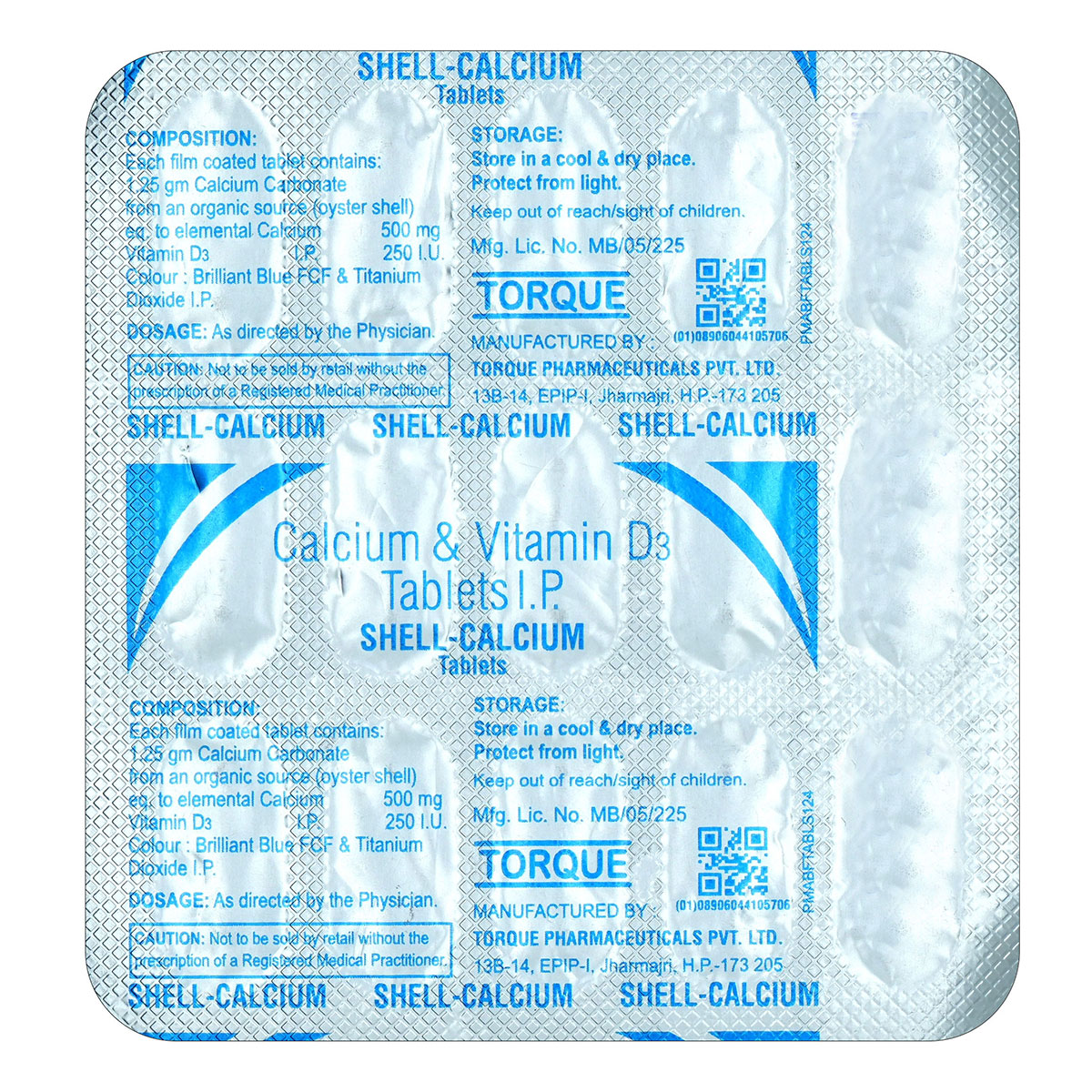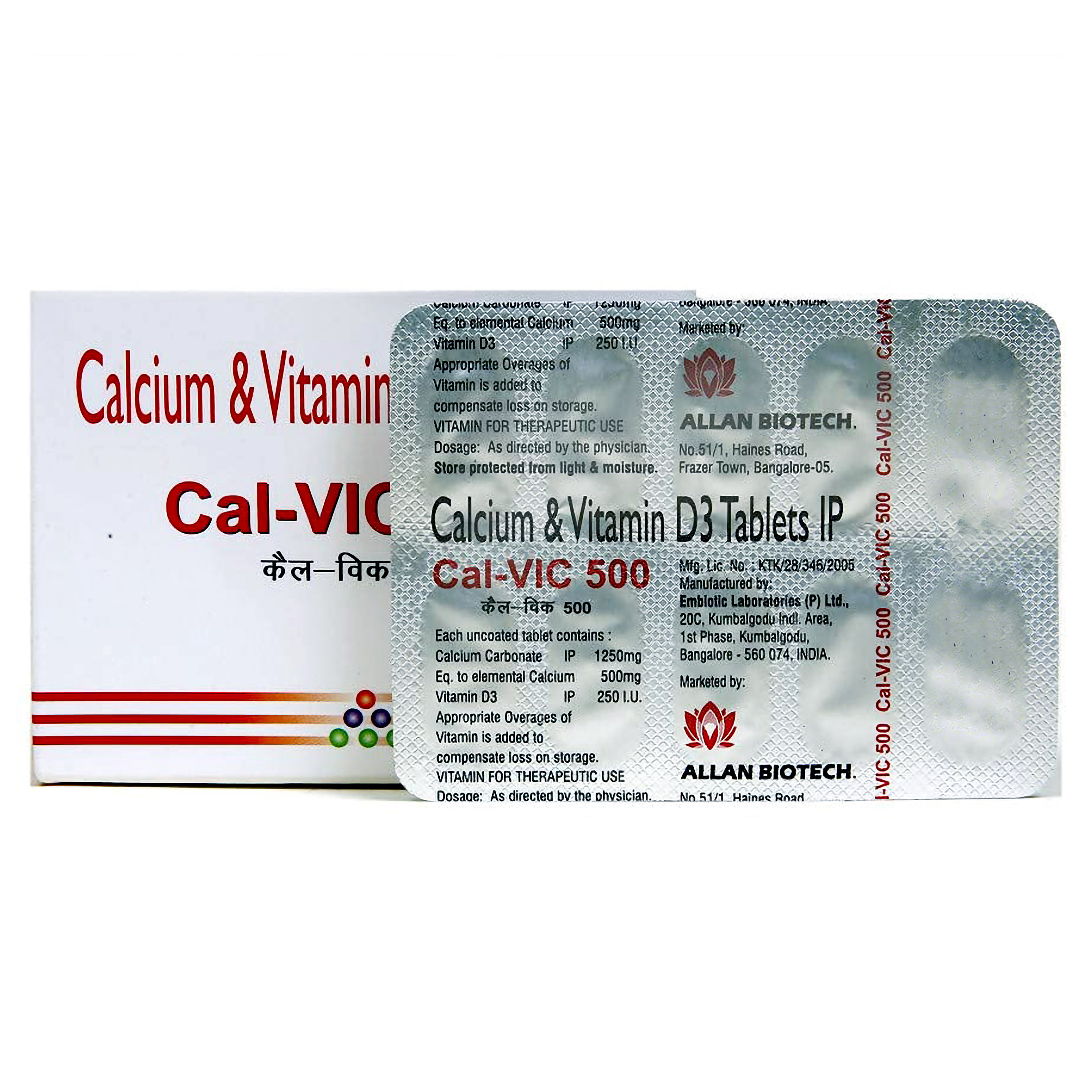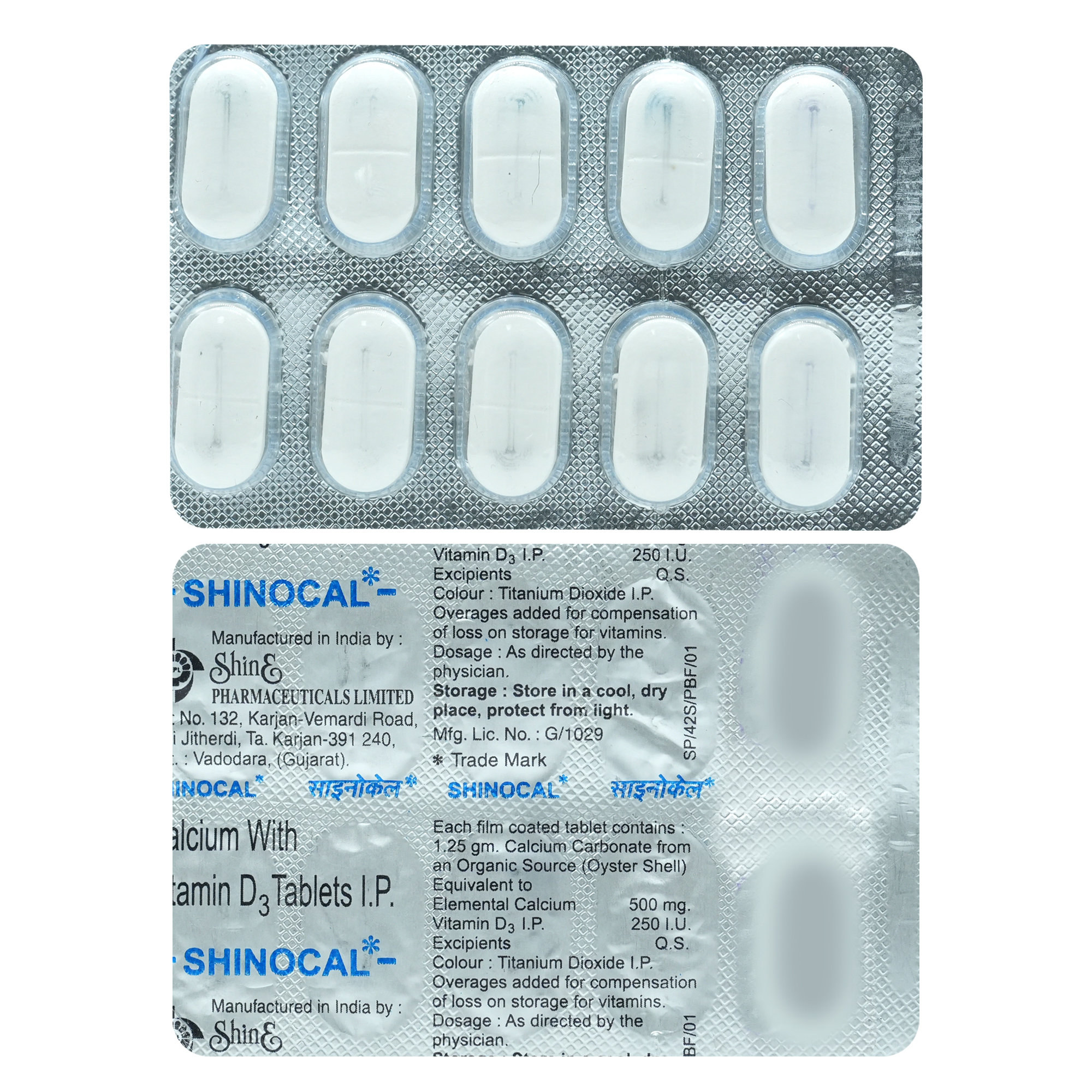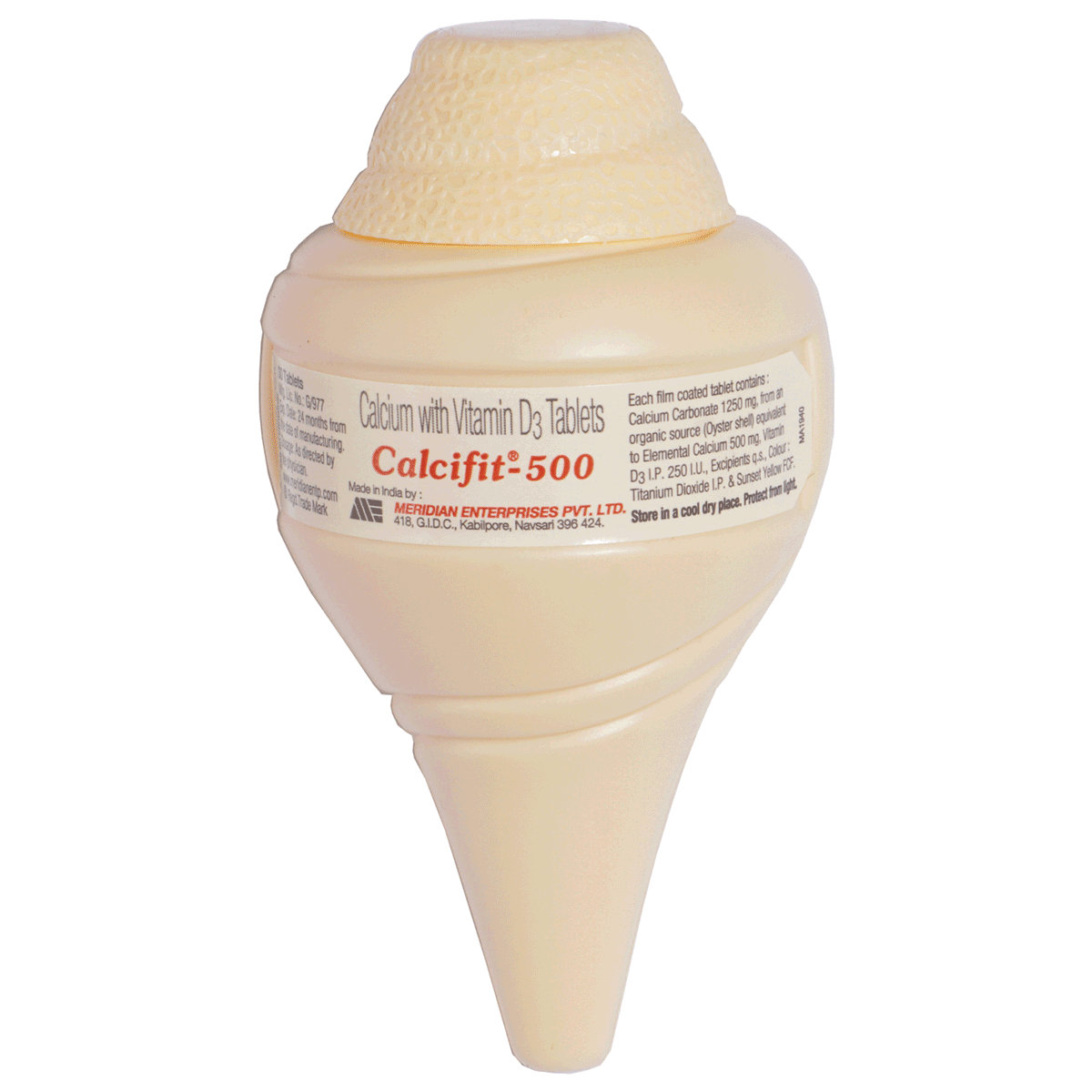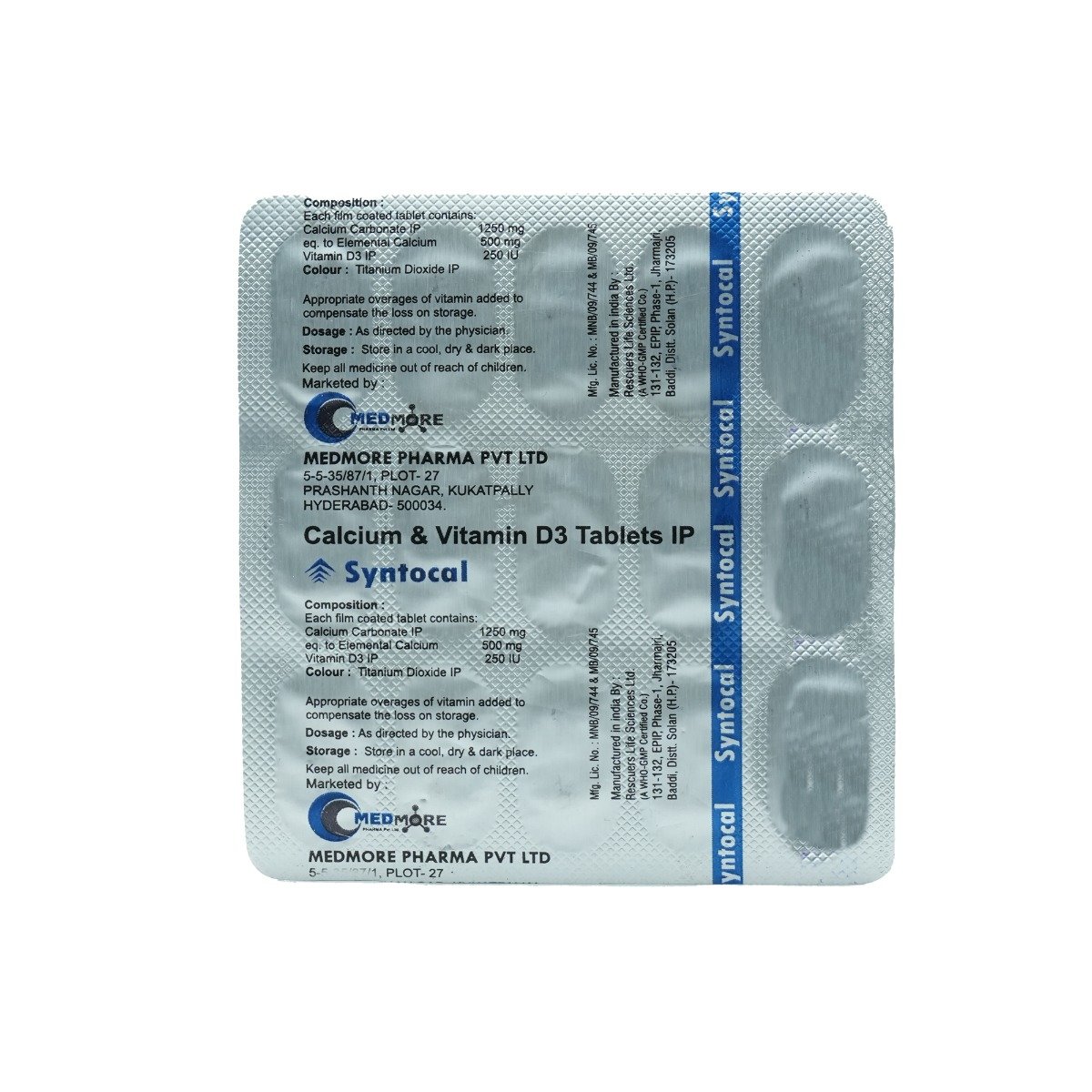- Home
- Calnitus Tablet
Calnitus Tablet Substitute
Calnitus Tablet Substitute
Medicine Composition:
CALCIUM-500MG+VITAMIN D3-250IUAll Substitutes & Brand Comparisons
- Apollo-Trusted
RX
Shell-Calcium Tablet 15's
Torque Pharmaceuticals Pvt Ltd
₹78.5
(₹3.93 per unit)
17% CHEAPER RX
Cal-Vic 500 Tablet 10's
Allan Biotech
₹50.5
(₹4.55 per unit)
4% CHEAPERRX
Shinocal Tablet 10's
Suzikem Drugs Pvt Ltd
₹54.5
(₹4.91 per unit)
2% COSTLIERRX
Calcifit 500 mg Tablet 30's
Meridian Enterprises Pvt Ltd
₹219
(₹5.99 per unit)
25% COSTLIERRX
Calvit-500 Tablet 15's
Marc Laboratories Pvt Ltd
₹104.5
(₹6.27 per unit)
31% COSTLIERRX
Ebaa Cal Tablet 10's
Ebra Life Sciences
₹71
(₹6.39 per unit)
33% COSTLIERRX
Bestbone Tablet 15's
Usk Health Care Pvt Ltd
₹119.5
(₹7.17 per unit)
50% COSTLIERRX
Syntocal Tablet 15's
Med Manor Organics Pvt Ltd
₹124.5
(₹7.47 per unit)
56% COSTLIERRX
Radcal 500 Tablet 15's
Radicool Pharmaceuticals Pvt Ltd
₹138.5
(₹8.31 per unit)
74% COSTLIERRX
Alcal-D 500 mg Tablet 15's
Alkem Laboratories Ltd
₹139
(₹8.34 per unit)
74% COSTLIERRX
Out of StockOrbitcal-500 Tablet 15's
Indorbit Pharmaceuticals Pvt Ltd
₹140.5
(₹8.43 per unit)
76% COSTLIERRX
Shelcal-500 Tablet 15's
Torrent Pharmaceuticals Ltd
₹148.5
(₹8.91 per unit)
86% COSTLIERRX
Incepcal 500 Tablet 10's
Incepta Pharma Llp
₹140
(₹12.61 per unit)
164% COSTLIERRX
Folical-CM Tablet 10's
John Biotech Pvt Ltd
₹150
(₹13.5 per unit)
183% COSTLIERRX
Calovit-D3 Tablet 15's
Medicsr Lifesciences
₹387.5
(₹25.83 per unit)
441% COSTLIER

When Should You Consider Switching from Calnitus Tablet ?
Patients may explore substitutes in the following scenarios:
- High monthly cost of Calnitus Tablet
- Non-availability in local pharmacies
- Generic recommendation by a doctor
- Side effects or better tolerability with alternatives
What to Know Before Switching
Before you switch from Calnitus Tablet to another medicine, here are some important points to keep in mind:
Same salt, different brands:
Most substitutes contain the same active ingredient - CALCIUM-500MG+VITAMIN D3-250IU, but the fillers, coating, or manufacturing quality may vary slightly.
Consult your doctor first:
Even if the salt is the same, your doctor can confirm if the substitute is right for your condition, dosage, and health history.
Watch out for allergies or reactions:
Some people may react differently to certain brands due to inactive ingredients. If you notice any side effects, inform your doctor immediately.
Price ≠ effectiveness:
A lower-priced substitute doesn't mean it's less effective. Many generic medicines work just as well as branded ones.
Check the dosage form and strength:
Always match the substitute’s strength (e.g., 5mg, 10mg) and form (tablet, capsule, syrup) with what your doctor prescribed.
Uses
Calnitus Tablet is used to prevent and treat calcium and vitamin D deficiencies, as well as to support bone health. The detailed uses of Calnitus Tablet are as follows:
- Treatment and Prevention of Osteoporosis: Calnitus Tablet helps improve bone strength and lowers the risk of fractures, particularly in older adults and postmenopausal women.
- Support for Bone Growth: Calnitus Tablet aids healthy bone development in children and adolescents during growth phases.
- Correction of Calcium and Vitamin D Deficiency: Calnitus Tablet is used for individuals with insufficient dietary intake, limited exposure to sunlight, or absorption problems caused by conditions like chronic kidney disease.
- Supplement in Bone Disorders: Calnitus Tablet assists in the management of bone diseases such as rickets, osteomalacia, and hypoparathyroidism.
- Relief of Muscle Cramps (Latent Tetany): Calnitus Tablet helps reduce muscle spasms and cramps caused by low blood calcium levels.
- Management of Vitamin D Deficiency: Calnitus Tablet treats disorders related to vitamin D deficiency, which can affect immunity and bone structure.
Medicinal Benefits
- Calnitus Tablet offers several medicinal benefits by helping to maintain strong and healthy bones through the prevention and treatment of calcium and vitamin D deficiencies.
- It reduces the risk of fractures, particularly in individuals with weakened bones such as those affected by osteoporosis.
- Calnitus Tablet supports proper bone growth in children and adolescents, and aids in managing various bone disorders, such as rickets and osteomalacia.
- It also helps relieve muscle cramps caused by low calcium levels and improves vitamin D status, which is important for immune function and overall bone health.
FAQs
The substitutes of Calnitus Tablet contain the same active salt(s) - CALCIUM-500MG+VITAMIN D3-250IU. However, they may differ in price, manufacturing quality, and inactive ingredients. Speak to your doctor to find a suitable option.
Switching to a generic substitute medicine in the place of Calnitus Tablet is often possible if it has the same salt, strength, and dosage form. But always check with your doctor before making any changes to your medication.
Generics versions of Calnitus Tablet are typically more affordable because they don’t include the original brand's research, development, and marketing costs. They contain the same active ingredient and are approved for safety and effectiveness.
Most people don’t notice any difference. However, some may react to different fillers or coatings. If you notice any unusual symptoms after switching, consult your doctor.
Make sure the new medicine has the same active salt, strength, dosage form. Always confirm the change with your doctor or pharmacist.
Substitutes of Calnitus Tablet meet the same safety and efficacy standards as Calnitus Tablet , but small differences in absorption or formulation can exist. A doctor can help you choose the right one for your needs.
Yes. Substitutes of Calnitus Tablet may vary in color, size, or shape due to differences in manufacturing and branding, but this does not affect how they work.
Yes, it’s generally safe to switch between multiple substitutes of Calnitus Tablet if they have the same salt and strength. However, always inform your doctor so they can monitor how your body responds.
Yes, many people safely use substitutes of Calnitus Tablet for long-term treatment. Just ensure it’s done under medical supervision.
If your symptoms stay under control or lab results remain stable, the substitute for Calnitus Tablet is likely working well. Regular follow-ups with your doctor are important.
Absolutely. Even with the same salt, small differences can affect how your body responds when switching from Calnitus Tablet to its substitute. Always consult your doctor before switching.
Calnitus Tablet is used to prevent and treat calcium and vitamin D deficiencies, support bone health, manage conditions such as osteoporosis and other bone disorders, and relieve muscle cramps and spasms caused by low calcium levels (latent tetany).
Calnitus Tablet provides the body with essential calcium and vitamin D needed for healthy bones and muscles. Calcium is a key mineral that builds and maintains bone strength, while vitamin D helps the body absorb calcium more effectively from food and supplements. Together, they ensure adequate calcium levels in the blood, support bone growth and repair, and help prevent muscle cramps caused by low calcium.
If you miss a dose, take it as soon as you remember. However, if it is time for the next scheduled dose, skip the missed dose and follow your usual dosage.
Milk is considered to be the best source of calcium. You can take Calnitus Tablet with milk. However, ensure you're not exceeding your daily calcium intake from combined sources (supplements + diet), as too much calcium can lead to kidney stones or other issues. Consult your doctor if you have specific dietary restrictions or conditions (e.g., kidney disease).
If you have high calcium levels in your blood (hypercalcaemia), you should not take calcium + vitamin D3 unless your doctor tells you to. It can make the condition worse and cause problems like kidney stones or other health issues. Always check with your doctor first.
Antacids may increase the absorption of Calcium from Calnitus Tablet . Hence, taking Calnitus Tablet two hours before or four hours after taking antacids is advised.
When taken as directed, Calnitus Tablet can be good for healthy kidneys, but excess intake may lead to hypercalcemia, which can cause kidney stones. If you have kidney diseases or are undergoing dialysis, consult a doctor before taking Calnitus Tablet .
Calnitus Tablet can be taken daily if your doctor advises, based on your individual health condition. Always follow the doctor's advice to ensure safety.
Common side effects of Calnitus Tablet may include constipation, stomach upset, nausea, vomiting, loss of appetite, weakness, tiredness, and headache. These side effects do not require medical attention and gradually resolve over time. However, you are advised to talk to a doctor if the side effects persist or worsen.
Buy best Health & Nutrition products by
SPECIALITY SUPPLEMENTS
Minerals
VITAMINS AND MINERALS
VITAMINS
OTHER SUPPLEMENTS
ADULT NUTRITION
Protein Supplements
OMEGA & FISH OIL
SINGLE VITAMIN
WEIGHT LOSS
KIDS NUTRITION
SEXUAL HEALTH SUPPLEMENTS
BONE & JOINT SUPPLEMENTS
AMINO ACIDS
HEMATINICS
WELLNESS DRINKS
WOMEN HEALTH SUPPLEMENTS
AMINO ACID SUPPLEMENTS
WEIGHT GAIN
GASTRIC DISORDERS SUPPLEMENTS
HEALTH FOODS
IMMUNE HEALTH SUPPLEMENTS
MULTIVITAMINS
CARDIAC SUPPLEMENTS
WEIGHT LOSS AND WEIGHT GAIN
DIABETICS SUPPLEMENTS
Vlado Sky Enterprise Pvt Ltd
Sun Pharmaceutical Industries Ltd
Intas Pharmaceuticals Ltd
Mankind Pharma Pvt Ltd
Abbott India Ltd
Macleods Pharmaceuticals Ltd
Alkem Laboratories Ltd
West Coast Pharmaceuticals Pvt Ltd
Lupin Ltd
Emcure Pharmaceuticals Ltd
Meyer Organics Pvt Ltd
Eris Life Sciences Ltd
Nutritionalab Pvt Ltd
Akumentis Healthcare Ltd
Torrent Pharmaceuticals Ltd
British Biologicals
Cipla Ltd
Alniche Life Sciences Pvt Ltd
La Renon Healthcare Pvt Ltd
Leeford Healthcare Ltd
Micro Labs Ltd
Zuventus Healthcare Ltd
Pharmed Ltd
Corona Remedies Pvt Ltd
Dr Reddy's Laboratories Ltd
ABBOTT HEALTHCARE PVT LTD
East West Pharma India Pvt Ltd
Modi Mundipharma Pvt Ltd
Bright Lifecare Pvt Ltd
Indchemie Health Specialities Pvt Ltd
Koye Pharmaceuticals Pvt Ltd
Apex Laboratories Pvt Ltd
Aristo Pharmaceuticals Pvt Ltd
Hindustan Unilever Ltd
Zydus Healthcare Ltd
DR Johns Lab Pharma Pvt Ltd
Bioceutics Inc
Fourrts India Laboratories Pvt Ltd
Vasu Organics Pvt Ltd
Zydus Cadila
Alembic Pharmaceuticals Ltd
USV Pvt Ltd
ZYDUS WELLNESS LIMITED
Elder Pharmaceuticals Ltd
FDC Ltd
Herbs Nutriproducts Pvt Ltd
Indoco Remedies Ltd
Morepen Laboratories Ltd
Guardian Healthcare Services Pvt Ltd
Zee Laboratories Ltd
TTK Healthcare Ltd
Troikaa Pharmaceuticals Ltd
Glanbia Performance Nutrition India Pvt Ltd
Pulse Pharmaceuticals
Raptakos Brett & Co Ltd
Cadila Pharmaceuticals Ltd
Innovcare Life Sciences Pvt Ltd
Levin Life Sciences Pvt Ltd
Linux Laboratories Pvt Ltd
Ajanta Pharma Ltd
Medley Pharmaceuticals Ltd
Primus Remedies Pvt Ltd
Wockhardt Ltd
Kepler Healthcare Pvt Ltd
Sanatra Healthcare Ltd
Sanofi India Ltd
Wanbury Ltd
Aareen Healthcare Pvt Ltd
Adonis Laboratories Pvt Ltd
Hexagon Nutrition Pvt Ltd
Tablets India Ltd
Tas Med India Pvt Ltd
Elbrit Life Sciences Pvt Ltd
Medishri Healthcare Pvt Ltd
Nutricia International Pvt Ltd
Origin Nutrition Pvt Ltd
Overseas Health Care Pvt Ltd
Radicool Pharmaceuticals Pvt Ltd
Aeronutrix Sports Products Pvt Ltd
Anglo French Drugs & Industries Ltd
Cadila Healthcare Ltd
Daris Biocare
Maxamus Pharma Pvt Ltd
Ordain Health Care Global Pvt Ltd
Procter & Gamble Health Ltd
Icarus Health Care Pvt Ltd
Klm Laboratories Pvt Ltd
Panacea Biotec Ltd
Patanjali Ayurved Limited
Biovitamins Pvt Ltd
DR.REDDY'S AND NESTLE HEALTH SCIENCE LTD
Mova Pharmaceutical Pvt Ltd
Ozone Pharmaceuticals Ltd
Signova Pharma
Winmark Healthcare Pvt Ltd
Cachet Pharmaceuticals Pvt Ltd
Femura Pharmaceuticals Pvt Ltd
Ipca Laboratories Ltd
Lloyd Healthcare Pvt Ltd
Med Manor Organics Pvt Ltd
SPECIALITY SUPPLEMENT
CALCIUM
Specialty Supplements
VITAMIN D
IRON
VITAMIN B12
VITAMIN B
VITAMIN C
COLLAGEN
FISH OIL OMEGA
Adult Nutrition Drink
MULTIVITAMIN
ZINC
VITAMIN B9
VITAMIN E
Kids Nutrition Drink
WHEY PROTEIN
SEXUAL HEALTH SUPPLEMENT
MAGNESIUM
Protein Powder
SPECIALITY NUTRITION DRINK
VITAMIN B1
SUGAR SUBSTITUTE
Prebiotic & Probiotic
DIABETIC NUTRITION DRINK
Protein Bar
BIOTIN
WEIGHT LOSS
Fat Burner
ENERGY DRINK
WOMEN & MOTHER NUTRITION DRINK
PLANT PROTEIN POWDER
Apple Cider Vinegar
Lactation Supplements
MELATONIN
APPETITE STIMULANT
Flax seed Oil
VITAMIN A
ORS
AMINO ACID
Meal Replacement
Ashwagandha
Pregnancy Supplements
POTASSIUM
Pre Workout
Shilajit
VITAMIN B6
L-Carnitine
VITAMIN K
CREATINE
CURCUMIN
Mass Gainer
Cod Liver Oil
Ayurvedic Capsules
VITAMIN B5
ARGININE
Glutathione
VITAMIN B2
COENZYME Q10
Chromium
Women Nutrition
Kids Gummies
MILK THISTLE
VITAMIN B3
Appetite Suppressant
Ayurvedic Tablets
Chyawanprash
MORINGA
L-Glutamine
SPIRULINA
WEIGHT GAINER
GARCINIA CAMBOGIA
HERBAL JUICE
Instant Food
ALPHA-LIPOIC ACID
BCAA Protein Powder
DISKETTE
GLUCOSAMINE
GOKSHURA
Tulsi
ANTACID
Brahmi
Chocolate
GILOY
NEEM
NUTRITION DRINK
SELENIUM
TRIPHALA
Amla
BREAKFAST CEREAL
GREEN TEA
Honey
MILKSHAKE
PAIN RELIEF TABLET

